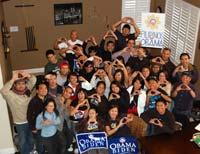Asian-Americans pivotal in Obama-Romney race

Asian Americans could determine the electoral outcome in US swing states with large Asian populations, as President Barack Obama and Republican challenger Mitt Romney are neck-and-neck in the race, experts said.
There are nearly 18 million Asian Americans in the US, and the country’s most rapidly growing minority has expanded by 46 percent over the last decade.
In 2010 the group comprised 5 percent of the country’s total population in 145 congressional districts and more than 600 cities. Most importantly for the upcoming presidential elections, 600,000 new Asian American voters entered the electorate in 2008, with a similar number of voters expected in November, according to the 2012 National Survey of Asian Americans and Pacific Islanders.
The Asian population has doubled over the last decade in hotly contested Virginia, growing to nearly 14 percent, according to US census figures. In Fairfax county, 30-minute drive from the nation’s capital, Asians comprise nearly 18 percent.
Still, the group has one of the lowest rates of voter registration, and even those who vote tend not to do so in the same percentage as other groups.
A recent study by APIAVote in association with Lake Research Partners found that both Democrats and Republicans have largely ignored this group of voters. Only 23 percent of Asian Americans say they have been contacted by the Democratic Party in the past two years and 17 percent by the Republican Party.
But officials from the Obama campaign said they are fighting for the Asian-American vote.”This campaign is not taking them for granted. We have a very active Asian American outreach program,” said Cabinet Secretary and co-chair of the White House Initiative on Asian Americans and Pacific Islanders Chris Lu, in an interview with Xinhua.
In undecided states with rapidly growing Asian-American populations such as Nevada and Virginia, Asian Americans could provide the push that puts either candidate over the finish line amid a neck-in-neck race, said Mee Moua, president of the Asian American Justice Center and former Minnesota state senator, in an interview with Xinhua.
Contrary to the often-held belief that Asian Americans are solidly in the corner of Democrats, Moua noted a 31 to 34 percent independent block within the Asian American community that is neither Democrat nor Republican.
“People should not write this community off as already... bought by the Democratic Party,” she said last month at a panel discussion at the Woodrow Wilson Center.
Indeed, while President Obama in the last election took 62 percent of the Asian American vote, the recession has had a devastating impact on small businesses and disproportionately impacted Asian Americans.
As such, the president is not faring as well with Asian voters as he did in 2008, said Henry Olsen, director of the National Research Initiative at the American Enterprise Institute, in a panel discussion at that think tank Thursday.
Of major importance to Asians living in the US is immigration reform, as many are unable to remain in the country after completing a university degree here because of difficulties obtaining work visas.
The Obama administration has promised to overhaul the nation’s broken immigration system but has been criticized for dragging its feet on the issue.
Lu said the US needs to do more to encourage foreign students to start businesses here, but added that the visa issue remains a problem.
When asked what specific steps the administration would take to rectify the situation, Lu said those would come with comprehensive immigration reform. He added that there are a number of proposals on the table, but did not give any specifics.
Meanwhile, a report said Filipino-Americans will have a significant impact on the US presidential election next week as 700,000 of them are eligible to vote, according to a US Embassy official.
In an interview with GMA News Online, Cynthia Cook, Deputy Press Attaché of the US Embassy in Manila, said “a lot of them are concentrated in California, Texas, New York, Illinois.”
Cook added that the states of Nevada and Virginia are considered swing states and can significantly shift the win either toward Obama or Romney.
“That means that it’s in the candidate’s interest to get those states and really heavily campaign there,” she said.
“So like Nevada, there are about 100,000 Fil-Ams there. In such a small swing state, they really could have an impact in the US election,” she continued.
US Ambassador to the Philippines Harry Thomas, Jr. said the availability of ballots in the Tagalog language in Nevada shows the significance of the Fil-Am vote.
“In Nevada there are over 100,000 Filipino-Americans registered. They all vote. Imagine how they will influence the elections,” he said.
A report of the news site Examiner said Democrats outnumber Republicans among Asian-Americans, 53 percent to 16 percent, in Nevada.
“But a large percentage, 31 percent, are either Independents, or refuse to identify their party affiliations. At 25 percent, Filipino-Americans are the most Republican among Asian-Americans,” the report said.
It noted that Fil-Ams, mostly employed in casinos or health care facilities, are also the largest Asian group in Las Vegas, estimated to be at least 30,000.
In the 2008 presidential elections which Obama won, 50 percent of Fil-Ams voted for him while only 46 percent voted for Republican Senator John McCain.
However, Republican candidate Romney is being favored by the Filipino community in the upcoming elections, a report on the news site Asian Journal said.
Leave a comment









